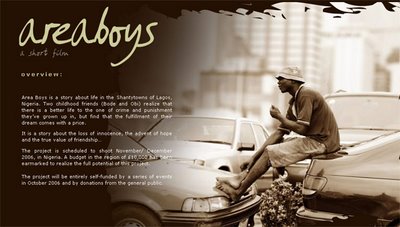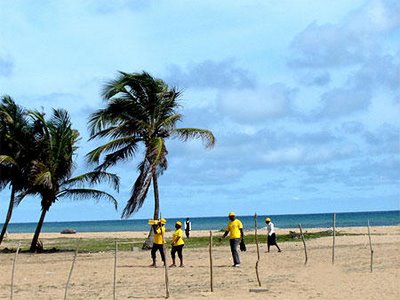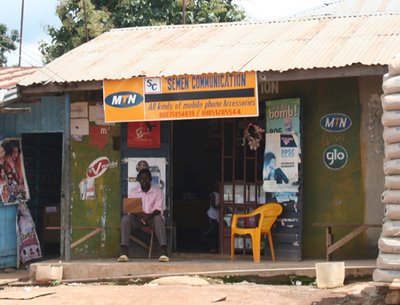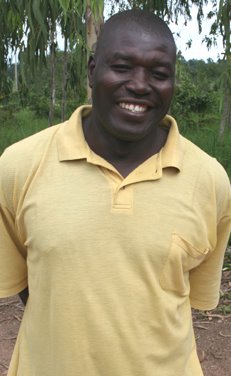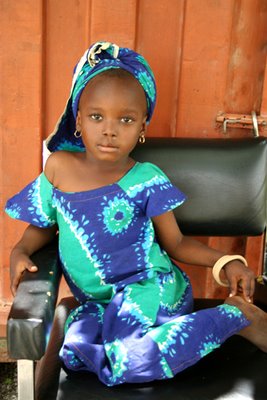Alex Hannaford's piece in the Sunday Independent was extensively edited. Here is the uncut version:
In the distance the chicken is flapping around uncontrollably as Johnson holds it by its feet. He gives us the thumbs up and disappears behind a small wooden shack. Forty-five minutes later he's crouching over a small makeshift barbecue on the sand, grilling the bird he's just killed, gutted and plucked, occasionally dusting the pieces of meat with a concoction of hot African spices. He serves it under a wooden sun shelter with dishes of rice and beans and a tomato and onion salad. To wash it down we swig palm wine – the African equivalent of moonshine – which sounds glorious and is apparently “good for the body” but which tastes revolting.
Tarkwa Bay, with its whispering palms and golden sand is almost exactly as I remember. I was last here in 1979; I spent the early part of my childhood in Nigeria when my dad worked for a French bank in the then-capital, Lagos, and since I got married in 2003 I'd wanted to bring my wife to see the place I called home for so long.
On the 25 minute boat ride to the beach, the engine conked out three times – once, we’d even drifted gently into the side of a gigantic tanker moored in Lagos harbour and I laughed as I remembered a letter I’d read before this trip that mum had written to my dad’s parents back in 1976: “We set off for a place called Tarkwa Bay as we’d heard it was nice there and safe to swim. We nearly didn’t arrive as half way across the bay, one of the engines stopped in the speedboat and gushed loads of smoke. Talk about panic!”
Times, it seems, haven’t changed. But it wasn’t long before we got going again, turned a corner, and arrived at the idyllic-looking beach – waves crashing onto the foreshore – that I hadn’t seen for 17 years. There’s rubbish piled up at one end now, and some of the beach huts have fallen into disrepair, but it’s still a wonderful respite from the madness of nearby Lagos – one of the most populous cities on earth.
I have vivid memories of Tarkwa. Back in the 1970s you were dropped off the other side of the bay and had to walk through palm trees and across baking hot sand for what seemed like miles (but was probably only a couple of hundred feet) before arriving at the bay. My feet would be scalding and I’d have to cool them off in a large stone trough next to a little shack known as Shell House. I also remember shark nets being dragged up the beach here, caught in the treacherous waters of the Bight of Benin.
Today you’re dropped off right at the beach and locals swarm to meet you, offering everything from tours of Tarkwa and bottled water, to food, shelter from the sun, and even marijuana. Today sharks are rarely landed here (“they’re too small,” we’re told), and the rusting remains of a railway track and an old carriage still lead down a palm-fringed spit that juts into the sea – just as they did in the ‘70s.
Unfortunately, one thing I had forgotten was just how hot the African sun can get and I nursed a sunburnt back for two days before developing sunstroke.
My wife, Courtney, and I started our trip in Abuja, the fastest-growing city in Africa, and which took over from Lagos as the country’s capital in 1991. We landed in the darkness of the early hours of the morning in a dramatic rainstorm and the lights along the 30km airport road were all out. I asked our cab driver if there was a power outage. "No,” he said. “These are part-time lights.” He drove the rest of the way to our friend's house in the upmarket Maitama district, desperately trying to avoid other cars and sliding off the road, despite only being able to see a foot in front of him.
Electricity failure is a problem in Nigeria. I remember my dad bemoaning the constant power failures back in the '70s. The National Electrical Power Authority – better known by its acronym NEPA – was nothing short of disastrous. The locals said it actually stood for 'Never Enough Power Always'. Last year NEPA changed its name to the Power Holding Company, Nigeria, the acronym of which some wag decided stood for 'Problem Has Changed Name'. When it became a PLC it was 'Problem Has Changed Name, Please Light Candle'.
After trying a Nigerian institution – pepper soup with goat meat – at the Nicon Hilton hotel, we headed to Katampe hill, one of the highest points in Abuja, for the best view of the city. Although there’s a barbecue spot at the top, half way up it’s home to local radio station, Aso, and you need to sign a book before continuing to the top.
“Why do you want to go up there?” an official asked.
“We want to have a look at the view,” I explained.
“You want to make an inspection?" he said.
This is one of the problems with Nigeria. Our friend, Paul, told us this is one of the best views in Abuja, and yet there is always suspicion. Nigeria – although it has some incredible scenery and wonderful potential tourist spots – just isn’t geared up for tourism. On the way down, the gate had been mysteriously closed and a 'guard' wanted to inspect the boot of our car. Quite what he thought we could have stolen from a barren hill, I have no idea.
The following afternoon a taxi drove us three hours north of Abuja to Jos, nestled in beautiful Plateau State. As we left Abuja a guy with an AK47 slung over his back relieved himself at the side of the road. Round the corner a man was walking along the street with a monkey on a lead, and at a set of lights someone was holding two fresh tilapia in his hand: close your eyes for a second and you’ll miss everything.
There were no road markings on the highway out of the city, but there seemed to be around three lanes in each direction – although nobody takes any notice of these. Along the side of the road, a mixture of residential mud shacks and aluminium-roofed huts selling everything from wheelbarrows to foam and mobile phone cards jostle for space in the red dirt.
Women dressed in vibrant colours carry their children on their backs for miles from their remote homes to the nearest village.
There are signs for 'The Lord's Chosen Charismatic Revival Movement' and an Anglican church. Further up the road is 'God's Own School'; the country is more or less 50 per cent Christian, 50 per cent Muslim.
One of the things that affected Courtney most was the dramatic contrast between the beauty of the lush green countryside, and the desperate poverty of the people living in both the villages that crop up every half an hour or so, and the cities.
There are a number of check-points on the road to Jos – most manned by scruffy-looking men in military clothes, using tree trunks to slow the traffic. Our driver, Ado, said it's to prevent armed robbers, but this is only really a problem after dark and during the day most of these checkpoints are simply ways to make money – known as 'dash'. Luckily we were waved through all of them.
Just before Jos we stopped so I could buy some sugar cane. It's not good for your teeth but I used to chew this as a child and wanted to try some again. Our car was suddenly surrounded by children: one selling tiny black fruits from plastic bags, another offering fresh oranges. A tiny boy appeared carrying two cages containing canaries and parakeets.
Jos itself is underwhelming considering the beauty of the drive leading up onto the vast plateau on which it lies, and like in Abuja, okadas (motorbike taxis) weave through the congested, fume-filled roads.
Taking our life in our hands, Courtney and I decided it was the quickest (and cheapest at around 20p a journey) way to get around and headed for the local market on the back of two okadas. Chickens were lying subdued in a circle at the feet of a hawker. Children were selling suya, corn and peanuts from bowls balanced on their heads. Others were touting phone cards, belts and Western clothes over persistent shouts of ‘bature’ - meaning white man in the Hausa language (further south it's usually the Yoruba phrase 'Oyibo')
That evening rain struck and we took a taxi to a restaurant. I politely pointed out water was leaking from the sunroof onto Courtney’s leg and the driver told us it was 'a consequence of the Nigerian economy'. This was just before we broke down – not for the first time on our trip. The driver was forced to brave the torrential rain, flag down a passing okada, and head back down the potholed road for fuel, but it was to no avail. The car was kaput and we sent the okada to find us another taxi.
The second breakdown occurred on the way to what is potentially Nigeria's biggest tourist attraction – the Yankari Game Reserve – which lies three hours east of Jos. The battered 1980s Golf we were in gave up just south of Bauchi town and we wobbled along the road for a little longer before the driver pulled over and realised the axel had split.
Another of the great ironies of Nigeria. In England this would be a major job for a car repair shop – possibly a week's work and a lot of money. Although we had to flag down another car to take us the remainder of the way to the game reserve, our driver Tunde promised he'd be there to pick us up by 4pm after getting his axel welded.
We flagged down a small minivan or 'bush taxi' and two Muslim men sat in the front blaring out Islamic music from their stereo for the remainder of our journey. We shared the back with a boy and two chickens he had just bought from the market.
Almost all Westerners in Nigeria are there because a) they work in the oil industry, b) they work in telecoms, or c) they are missionaries. It’s rare to find tourists, and with this in mind you’d think they'd welcome you at Yankari with open arms.
"Do you have your passports?” the official asked. Only two out of our group of four did and thereafter transpired a lengthy conversation of the type which ultimately ends in us being allowed through but only after we thank the official profusely and make it clear we acknowledge he's doing us a huge favour. Then there was the small matter of our cameras. Permits for 'professional' cameras - which at Yankari means any digital camera - are 1000 Naira each (about £4). Amateur cameras - which in my case meant my professional Canon SLR - was just 100 Naira (simply because it wasn't digital). I was sure it made some sense to someone.
Still with a half an hour journey ahead of us, 10 kilometres past the entrance to the park we were met by a truck blocking our way. We had been driving four hours already and even without the obstruction we would only get two hours at the warm springs and no time to go on a safari. An hour later, after two trees were uprooted and a path cleared around the truck, we were on our way. We now had only an hour for a swim.
The Nigerian government, recognising the potential of Yankari, is funding an ambitious redevelopment programme – new roads, a new visitor centre and hotel – and when it’s ready it should be good. At the moment, baboons and warthog wander inquisitively round the building site.
Back at the gates we met the head of tourism for Bauchi State, in which Yankari lies. He told us a park worker had informed him that earlier that his car had been blocked by a pride of 10 lions that morning. In truth it’s doubtful this happened at all; either the official was trying to impress us, or the park worker was trying to impress the official. According to the Bradt guide to Nigeria, due to poaching and a rinderpest epidemic, ‘today Yankari is largely empty, though supposedly there are over 50 species of mammals … including leopard, antelope, lion, hyena and buffalo, though they are rarely sighted.’
Nothing could have prepared Courtney for the sheer madness of Lagos – not even a brief sojourn elsewhere in Nigeria. It is one of the busiest, dirtiest, most dangerous, vibrant, colourful, wonderful cities on earth. Those with a nervous disposition need not apply. I told Courtney once she’d been there she could pretty much go anywhere.
Lagos sprawls from the mainland to several islands and each is connected by road bridges. In the ‘70s my family lived on Victoria Island – still an expat haunt and one of the safest places in the city. To get there from Lagos airport you need to brave the Third Mainland Bridge – at over 10 kms, one of the longest in the world. This bridge has a fearsome reputation for crime at night but during the day its congestion (known locally as the ‘go slow’) is a perfect place for hawkers. One friend says you can leave your house naked in the morning and arrive at work washed, shaven, teeth clean, dressed, and smelling of aftershave, just by buying things from the vendors that weave in and out of the traffic. Add to that hot water bottles, Nike t-shirts, hats, knives, steering wheel covers, chess sets, and badminton rackets, and you need never visit a shop again.
We tried to find our old flat – I knew the street and the plot number – but it had been redeveloped beyond recognition and our block must have been knocked down. We sat sipping Chapman’s (a non-alcoholic Nigerian tradition consisting of ginger beer, orange squash, angostura bitters and sparkling water) at the Eko hotel. It’s changed little since we lived out there and huge calabashes still hang from the ceiling over an outdoor pool-side bar.
We would also visit Badagry Beach back in the ‘70s – then an hour’s drive from Lagos, but today more like two hours because of the traffic. At the nearby Mobee Family Slave Relics Museum, a teenage boy showed us centuries old shackles and chains used to enslave his forefathers before they were shipped off to Europe. It’s a tiny one-roomed museum but it’s enough. He showed us a lip iron. The oblong hollow disc would fit over a slave’s lips and a hot metal pin would pierce the top and bottom lip so he couldn’t speak. There were chains for children, a hoop used to secure two slaves together by their ankles, and he demonstrated a neck iron.
The Mobee family are descended from local Nigerian chiefs who share equal blame in the bloody trafficking. These elders would sell people to Europeans at auction every three months in return for weapons, intoxicating spirits and other goods. They would then be taken aboard slave ships, past the ‘point of no return’, and out into the Atlantic Ocean. We were told one out of five survived their journey by sea.
Ironically it was Chief Sunbo Mobee – the son of a slave trader – who stopped the trade out of Badagry.
On way back from beach we drive through five road blocks. At one we are pulled over by an immigration official who asks to look at our passports. “Have you been to the beach?” he asks. “What have you bought me?”
“Some sandy shorts,” I tell him.
They’re after money but humour usually works. A friend always says “I have bought you my blessings for your family and future”.
Nigeria is a country of dramatic contrasts. If you can escape the crime, survive the ‘go slows’, the officious officials, the scams, and deal with poverty on an unimaginable scale, it has the potential to be such an incredible destination. It isn’t there yet, and I’m not sure Courtney would rush back, but I will return – that’s for sure. In fact I miss it already.
Read more...

